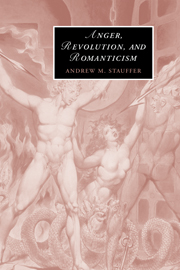Book contents
- Frontmatter
- Contents
- Acknowledgments
- List of abbreviations
- Introduction: fits of rage
- 1 Towards Romantic anger
- 2 Burke, Coleridge, and the rage for indignation
- 3 Inflammatory reactions
- 4 Provocation and the plot of anger
- 5 Shelley and the masks of anger
- 6 Byron's curse
- Epilogue
- Notes
- Bibliography
- Index
- CAMBRIDGE STUDIES IN ROMANTICISM
2 - Burke, Coleridge, and the rage for indignation
Published online by Cambridge University Press: 22 September 2009
- Frontmatter
- Contents
- Acknowledgments
- List of abbreviations
- Introduction: fits of rage
- 1 Towards Romantic anger
- 2 Burke, Coleridge, and the rage for indignation
- 3 Inflammatory reactions
- 4 Provocation and the plot of anger
- 5 Shelley and the masks of anger
- 6 Byron's curse
- Epilogue
- Notes
- Bibliography
- Index
- CAMBRIDGE STUDIES IN ROMANTICISM
Summary
In his 1796 Letters … on the Proposals for Peace with the Regicide Directory of France, an exasperated Edmund Burke looks back on the long series of outrages that for him have constituted the French Revolution, and asks his readers to suppose for a moment that all of these things had occurred in England's green and pleasant land:
Should we not obtest Heaven, and whatever justice is yet on Earth? Oppression makes wise men mad; but their distemper is still the madness of the wise, which is better than the sobriety of fools. Their cry is the voice of sacred misery, exalted, not into wild raving, but into the sanctified phrensy of prophecy and inspiration – in that bitterness of soul, in that indignation of suffering virtue, in the exaltation of despair, would not persecuted English loyalty cry out, with an awful warning voice, and denounce the destruction that waits on Monarchs? … Would not this warm language of high indignation have more of sound reason in it, more of real affection, more of true attachment, than all the lullabies of flatterers, who would hush Monarchs to sleep in the arms of death?
As both disquisition upon and exemplification of the complex discourse of political anger during the 1790s, this passage is particularly revealing. Burke writes here in a high Juvenalian style, associating angry rhetoric with wisdom, virtue, and sincerity, and setting it against foolish moderation and deceitful flattery.
- Type
- Chapter
- Information
- Anger, Revolution, and Romanticism , pp. 38 - 63Publisher: Cambridge University PressPrint publication year: 2005

